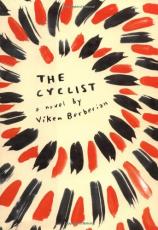The Cyclist
Review
The Cyclist
Terrorists, especially these days, are understood to be ruthless,
fanatical and evil people; their motivation understood as blind
hatred and rage. Viken Berberian's unnamed narrator in THE CYCLIST
is a terrorist moved to violence by the injustices he perceives
around him. Yet, stronger than his rage is his humanity. With sharp
wit and stinging insight, Berberian's short novel allows the
humanity of his terrorist to take center stage.
Berberian's terrorist is a cyclist. Cycling is his preferred method
of transportation, his intended means of delivering a bomb, one of
his passions. His other passions are food, his girlfriend Ghaemi,
and justice, roughly in that order. The novel begins with our
unlikely protagonist lying in coma after a bicycle accident. His
time is spent thinking about food, his family, Ghaemi, and his
terrorist organization, The Academy. The Academy is multi-ethnic
and multi-national and seeks justice only through retribution and
violence. Its plan is to bomb a Beirut hotel during a bicycle race,
killing hundreds of civilians. And, it is, of course, our narrator
who is to deliver the bomb. His plans, however, are challenged
after the death of a comrade and some amazing news from Ghaemi. He
must now reconsider the effectiveness of his proposed bombing and
the sacrifices he is willing to make in the name of his
cause.
One of the ways Berberian is successful in humanizing his narrator
is through an obsession with food. For the cyclist, as for all of
us, food has emotional connotations that transcend the need for
sustenance. His musings on food are poetic and wonderfully
descriptive. For the cyclist, food represents health, safety, and
happiness; it represents the best of all the cultures found in the
Middle East. The few details we can garner about his identity or
past are often linked to the types of dishes he describes. The
foods he craves most are the ones that connect him with his varied
heritage and those that remind him of his girlfriend. Food, or
descriptions of, and cravings for food are in fact the main means
of emotional expression we find in the narrator. Even The Academy
realizes the importance of food --- its links to memory, emotion,
and culture --- and it provides its members with a chef.
We learn that the cyclist's family is loving, open-minded and
multicultural. His parents represent the peaceful possibilities of
the Middle East and, in fact, have overcome stereotypical
prejudices to marry each other. The cyclist's idyllic childhood was
shattered, however, when a bomb was dropped on his quiet village.
After that tragedy, both Ghaemi and the cyclist become politically
radical and are thus encouraged to join The Academy.
More of a character sketch than a plot-driven novel, THE CYCLIST is
at turns angry and sweet, brutal and funny, surreal and realistic.
The scene and character motivations are purposefully vague; the
cyclist is undoubtedly Middle Eastern, yet he is seemingly
affiliated with the Druze, Muslim, and Jewish cultures. His plans
are short-sited and often selfish, and it is not until the end that
he begins to think of the future. Despite its reliance on humor,
THE CYCLIST is not an uplifting nor even optimistic book.
Reminiscent of the type of cynical and violence-filled humor of
Israeli author Etgar Keret, THE CYCLIST is at once terrifying and
hilarious. It is not a defense of terrorism but instead the tale of
an endearing and conflicted character that will undoubtedly remain
in the mind of the reader long after finishing the novel.
Berberian's first novel is highly recommendable despite a less than
clear ending.
Reviewed by Sarah Rachel Egelman on January 21, 2011
The Cyclist
- Publication Date: March 6, 2002
- Genres: Fiction
- Hardcover: 192 pages
- Publisher: Simon & Schuster
- ISBN-10: 0743222830
- ISBN-13: 9780743222839




